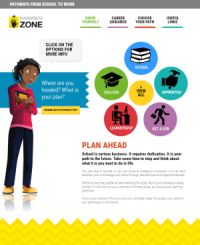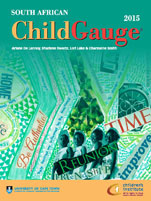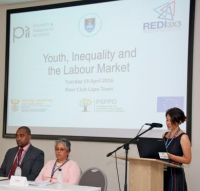A Focus on Youth
At the time of South Africa’s transition to democracy, hopes were high for the cohort of children born at that time. Now more than two decades into democracy, this group of children is ’coming of age’. Despite the many promises of a ‘better life for all’, racial, class and gender inequalities continue to shape these young people’s lives, dreams and opportunities. Levels of school drop-out, un(der)employment and discouraged work seekers are high, especially among previously disadvantaged groups. The situation has again given rise to the labelling of South Africa's youth as a threat to society – ‘a lost generation’ or ‘a ticking time bomb’ that needs to be ‘diffused’.
But how much do we really know about the ways in which young people in South Africa experience their lives and engage with the structural forces impacting on them? How much of that understanding is taken into account when developing policies and interventions aimed at supporting youth development? In its endeavours to engage meaningfully with the key challenges facing South Africa, the youth focus of the PII is a response to the need for evidence-based interventions aimed at empowering youth to create meaningful lives for themselves, and to break the intergenerational cycle of poverty. It calls for concerted efforts to bring together research, policy and practice in collaborative moments of knowledge exchange and creation.
To launch this area of work, the PII hosted a multi-disciplinary colloquium, entitled 'Youth in South Africa: Uncertain Transitions in a Context of Deprivation', with academics and practitioners in August 2014. Since then, various projects have since been initiated under the PII’s youth theme, all with the dual aim of:
- conducting, facilitating and collaborating on systematic, robust and multi-disciplinary studies on youth in a context of deprivation; and
- creating pathways for the translation of research into evidence-based interventions and programmes.
Youth Projects

Indicators to monitor youth well-being
A collaborative project drawing on various data sources to develop a dashboard of indicators that measure and track key dimensions of youth well-being in South Africa at local, provincial and national levels over time.
Towards a basic package of support for youth
A multi-stakeholder consortium led by UCT’s PII/Southern Africa Labour and Development Research Unit (SALDRU) was established in 2027 to address the need for a comprehensive package of support for youth to help them to transition successfully to adulthood. Read More

Systematic overview of youth unemployment
Aiming for a multi-disciplinary approach, UCT’s PII and the University of Johannesburg’s Centre for Social Development in Africa (CSDA) led a dedicated team of researchers to conduct a systematic overview on the drivers of, policies and interventions related to, youth unemployment. The work culminated in a more comprehensive and integrated theory of change for youth employment, and has been translated this into a series of policy-oriented documents. Senior staff collaborated to support junior researchers or post-graduate students in producing the overview, synthesis and final reports. The project has been supported by the Research Project on Employment, Income Distribution, and Inclusive Growth (REDI3x3) and National Treasury's Jobs Fund.

Yazi - PII's youth information portal
With the aim to help young people in their quest for information on post-schooling opportunities, the PII in partnership with UCT's Children’s Institute, Ikamva Youth and the DG Murray Trust have developed 'Yazi', an easily accessible information portal that visually maps the pathways through the educational system – from grade 9 onwards – into higher education or into the world of work. It is meant to provide young people with the knowledge they need to make informed decisions about their educational or career trajectories.

2015 youth-focused Child Gauge
The South African Child Gauge® is an annual publication of the Children's Institute, University of Cape Town. It provides a snapshot of the status of children in South Africa, and in particular monitors progress towards the realisation of their rights. Each year, the publication focuses on a major challenge affecting children’s well-being as a lens to critically analyse the position of children and the potential policy responses required. The 2015 issue took a special focus on youth aged 15 – 24 years and was published in partnership with the PII.

Since 2014, the PII has organised - or partnered on the organisation of - a series of youth policy dialogues. These events brought together policymakers, researchers and civil society organisations to engage on what sort of policies would be most effective in steering the country towards a new and more inclusive and supportive development path for youth.